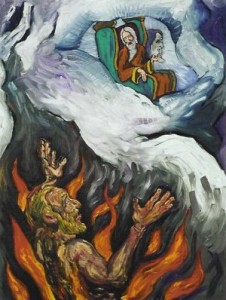 In Jesus’ parable of the rich man and Lazarus we read:
In Jesus’ parable of the rich man and Lazarus we read:
“There was a rich man who was dressed in purple and fine linen and who feasted sumptuously every day. 20And at his gate lay a poor man named Lazarus, covered with sores, 21who longed to satisfy his hunger with what fell from the rich man’s table; even the dogs would come and lick his sores. 22The poor man died and was carried away by the angels to be with Abraham.* The rich man also died and was buried. 23In Hades, where he was being tormented, he looked up and saw Abraham far away with Lazarus by his side.* 24He called out, “Father Abraham, have mercy on me, and send Lazarus to dip the tip of his finger in water and cool my tongue; for I am in agony in these flames.” 25But Abraham said, “Child, remember that during your lifetime you received your good things, and Lazarus in like manner evil things; but now he is comforted here, and you are in agony. 26Besides all this, between you and us a great chasm has been fixed, so that those who might want to pass from here to you cannot do so, and no one can cross from there to us.” 27He said, “Then, father, I beg you to send him to my father’s house— 28for I have five brothers—that he may warn them, so that they will not also come into this place of torment.” 29Abraham replied, “They have Moses and the prophets; they should listen to them.” 30He said, “No, father Abraham; but if someone goes to them from the dead, they will repent.” 31He said to him, “If they do not listen to Moses and the prophets, neither will they be convinced even if someone rises from the dead.” (Luke 17.19-30)
They will exchange the truth for a lie, self-glorification over glorifying God and love the created more rather than the Creator. (Cf. Romans 1.21-32, Jeremiah 2.5.) Christ offers his free gift of salvation but following him costs something. That something is everything.
Christ calls a rebellious generation to lay down their rebellion and surrender their whole being to Him. That means to love God with all their heart, soul and mind, and their neighbor with as fervent a love as they have for themselves (Matthew 22.37-39, cf. Deuteronomy 6.5, 10.12, 30.6.)
For most people it’s too much. Perhaps this has something to do with the narrow gate that leads to life and few are on it yet the broad way that leads to destruction has many. (Matthew 7.13-14)
The cost to follow Christ is simply too dear. He calls people from undeveloped spiritual vagueness to become wholly holy … to emerge squinting from spiritual darkness into Christ’s intense light — revealing and perfecting. Perfecting invariably involves pain. (See Catechism of the Catholic Church (CCC), 1430-1431.)
To follow Christ requires a change of mind, heart and morals (cf. CCC,368.) It requires a shift from self-centeredness to other-centeredness. People’s lifestyles, status, possessions, addictions, or other worldliness may be too important to them. They want a new set of values to accommodate those things.
Fulton Sheen wrote about the human desire to adopt new ethical systems, “…the tailoring of new standards of “morals” to suit our immoral ways of living.” They want a creed that suits their behavior and deeds and demands little from them.
I am increasingly convinced that most people do not have an intellectual problem with God; they have a moral problem with God. It’s not that they can’t believe in God. Their will is stubborn and they won’t believe in God. They want God on their terms not His terms.
It can’t be that way. God is perfect but humanity is deeply flawed and sinful. To ask a perfect God of love (1John 4.8) to be content with humanity’s imperfections of evil and not desire their removal, is to ask God not to be God. He was prepared to go to drastic lengths to make provision to reconcile sinful humanity back to himself for eternity (See John 3.16, 1John 2.1-2, 4.8-10. Also CCC, 976-987, 1422-1456)
Perhaps someone will say, “But I want God to accept me just the way I am.” He will. That is what Calvary was all about. But that perfect God is the very essence of love and won’t leave the imperfections unattended. They must be removed from the beloved to become more Christ-like. That is spiritual pilgrimage.
Perhaps someone else will comment, “I just want God to leave me alone.” If that’s what is really wanted, God will do that too. That’s leads to Hell.
It is not God’s desire that anyone would be lost (cf. Ezekiel 33.11, John 3.16, 1Timothy 2.3-5, 2Peter 3.9.) But God sets the terms of his heaven and salvation. Salvation that leads to God comes exclusively through faith in Jesus Christ (John 14.6, Acts 4.12).
There is someone who rose from the dead: It is Jesus Christ. There are millions of people are here who have encountered him: It is Jesus Christ. There is no need for anyone to live in present or future torment without Him. His Church can help to point the way to love the Lord your God with all our hearts, souls and our minds, and to love others as ourselves.



